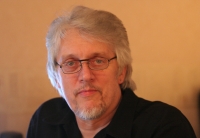
This turned out to be a more informal and interactive session which even included a chance to perform some music! Advertised as ‘everything you need to plan and deliver a successful community arts project’, the session was run by Marilyn Tucker and Paul Wilson, respectively Artistic Director and Music Director for Wren Music in Devon. With the two of them and five delegates seated around the table, we were able to get into serious discussion on the relationship between folk music and community activity.
Essentially, the session showed how folk music can be a catalyst for social action. Marilyn and Paul talked us through examples of projects they had run (are running) and then led a brainstorming session (if that term is still permissible) on how to set up a community arts project.
The music session, which immediately followed lunch, was a demonstration of how a workshop can be run. Each of us took up an instrument that we had never played before (in my case, a fiddle) and Paul taught us each a few bars of melody or rhythm. We put it all together and, hey presto, we had the makings of a folk orchestra. It was definitely a feel-good moment of the day and, as Paul pointed out, effectively put into practice Christopher Small’s concept of ‘musicking’.
Here’s my summary of the key points that I gained from this training day:
1. Communities can be defined in different ways, meaningful to different groups, i.e.
The term ‘folk song’ or ‘Volkslied’ was coined by Johann Gottfried Herder in the 19th century, while ‘World music’ was a term popularised by Peter Gabriel, referring (arguably) to ethnic music for white western markets.
(a) geography
(b) shared interest (e.g. fans, bikers, morris dancers, etc.)
(c) shared demographic details (e.g age, race, nationality)
(d) constructed or artificial community (e.g. constituency, newspaper circulation area, local radio transmission area)
(e) self-defining or self-selecting community or sub-community (e.g. based on style, taste, self-image, social class)
2. Folk (music) can be defined in terms of repertoire:
(a) traditional (sourced from archives and collections)
(b) vernacular (music as a form of expression by a specific nation, region or group of people)
(c) popular (literally ‘of the people’ with broad appeal)3. Organisations that run community projects or events may be:
- public (state funded)
- commercial
- voluntary (not for profit but may still be paid)
The activities also highlighted the intense planning process, especially the increasing need to obtain approvals from various bodies, e.g. CRB checks, Health and Safety legislation, equal opportunities; or research to ensure that religious observance or cultural practices are catered for.
There was also some discussion at the beginning and end of the session on the integrity of folk music and concerns that this should not be turned into something alien for people who are devoted to that music. Reference (quite emotional at one point) was made to the ‘Imagined Village’ project that was recently performed at the Warwick Arts Centre and regarded, by some, as a post-modern spectacular collage of musical styles reflecting an erstaz 'community' rather than a preservation of genuine folk tradition. (These views are not necessarly those expressed by this blogger - never saw the show but have seen the video clips!)
This indicated the importance of folk as a grass-roots, community based activity – a practice rather than a product.
FolkArts England community Wren Music Christopher Small Johann Gottfried Herder folk music definition Peter Gabriel Imagined Village



